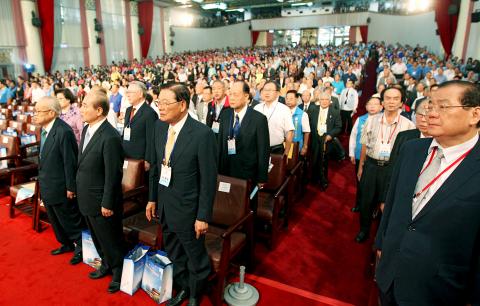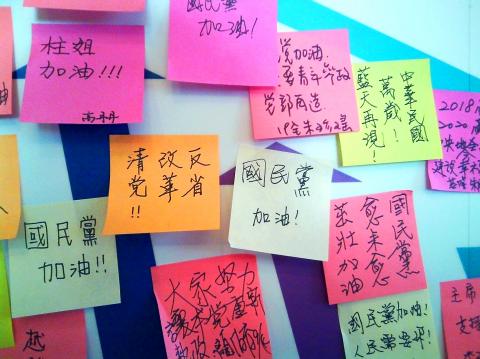The Chinese Nationalist Party’s (KMT) national congress yesterday passed an amendment to the party’s charter to allow members to directly vote for local branch directors, an amendment seen by some as aiming to weaken the party chair’s hold on power.
Local branch directors had previously been appointed by the head of the party.
Under the amendment to Article 26 of the charter, local branches will be able to elect their own directors, though the party leadership will retain the authority to appoint deputy directors and to ratify local appraisal committee members.

Photo: CNA
The KMT now has two months to form a committee to implement the changes that were outlined in the local branch amendment.
In line with the amendment, the party could hold combined elections in August next year for its chairperson, local directors and party representatives, which would be a first since the KMT’s founding more than 100 years ago.
In her closing remarks to the congress, which was held at Zhongshan Hall on Yangmingshan in Taipei, KMT Chairwoman Hung Hsiu-chu (洪秀柱) said she supports any change that can expand membership and connect the party’s leadership with its grassroots constituents.

Photo: Lu Yi-hsuan, Taipei Times
The KMT will move forward as quickly as possible by forming a task force to comprehensively investigate the qualifications, lengths of terms and fulfillment of obligations to central party leadership of local director candidates, so that direct elections can take place as soon as possible, she said.
However, reform does not “succeed on the first try,” she said.
“The Democratic Progressive Party allows its members to directly elect their local leadership, but it goes without saying whether they are biased or able to grasp society’s wishes, or what the public’s opinion of them is,” Hung said.
She said that she will try to “rebuild the party from ruins” by starting with “a perfect plan of action.”
Hung said she hopes passage of the amendment will not be seen as a victory by former vice president Wu Den-yih (吳敦義), who has voiced interest in entering the chairmanship race next year.
The KMT congress, the first held since the party’s bruising defeat in the January presidential and legislative elections, was attended by several former party chairmen, including former president Ma Ying-jeou (馬英九), former vice president Lien Chan (連戰), Wu Po-hsiung (吳伯雄) and New Taipei City Mayor Eric Chu (朱立倫).
Wu Den-yih and KMT Legislator Wang Jin-pyng (王金平), the former legislative speaker, also attended the one-day congress.
Initially, some senior party officials were opposed to amending the charter, but calls for reform were growing among grassroots members and they eventually ceded.
A KMT official who declined to be named said the party will meet with local branch officials in the coming days to discuss how to implement elections.
A regulation must be drafted for the regulation of the elections, and the Regulations Governing the Organization of Municipal and County Committees of the Chinese Nationalist Party (中國國民黨直轄市、縣[市]委員會組織規程) must be revised, the official said.
The regulations must be changed to reflect that branch directors will now be chosen through election, and that the KMT central leadership will retain the authority to appoint deputy directors and ratify local appraisal committee members, with the requirement that appointments must be made within a year of ratification.

Chinese Nationalist Party (KMT) Chairman Eric Chu (朱立倫), spokeswoman Yang Chih-yu (楊智伃) and Legislator Hsieh Lung-chieh (謝龍介) would be summoned by police for questioning for leading an illegal assembly on Thursday evening last week, Minister of the Interior Liu Shyh-fang (劉世芳) said today. The three KMT officials led an assembly outside the Taipei City Prosecutors’ Office, a restricted area where public assembly is not allowed, protesting the questioning of several KMT staff and searches of KMT headquarters and offices in a recall petition forgery case. Chu, Yang and Hsieh are all suspected of contravening the Assembly and Parade Act (集會遊行法) by holding

PRAISE: Japanese visitor Takashi Kubota said the Taiwanese temple architecture images showcased in the AI Art Gallery were the most impressive displays he saw Taiwan does not have an official pavilion at the World Expo in Osaka, Japan, because of its diplomatic predicament, but the government-backed Tech World pavilion is drawing interest with its unique recreations of works by Taiwanese artists. The pavilion features an artificial intelligence (AI)-based art gallery showcasing works of famous Taiwanese artists from the Japanese colonial period using innovative technologies. Among its main simulated displays are Eastern gouache paintings by Chen Chin (陳進), Lin Yu-shan (林玉山) and Kuo Hsueh-hu (郭雪湖), who were the three young Taiwanese painters selected for the East Asian Painting exhibition in 1927. Gouache is a water-based

Taiwan would welcome the return of Honduras as a diplomatic ally if its next president decides to make such a move, Minister of Foreign Affairs Lin Chia-lung (林佳龍) said yesterday. “Of course, we would welcome Honduras if they want to restore diplomatic ties with Taiwan after their elections,” Lin said at a meeting of the legislature’s Foreign Affairs and National Defense Committee, when asked to comment on statements made by two of the three Honduran presidential candidates during the presidential campaign in the Central American country. Taiwan is paying close attention to the region as a whole in the wake of a

OFF-TARGET: More than 30,000 participants were expected to take part in the Games next month, but only 6,550 foreign and 19,400 Taiwanese athletes have registered Taipei city councilors yesterday blasted the organizers of next month’s World Masters Games over sudden timetable and venue changes, which they said have caused thousands of participants to back out of the international sporting event, among other organizational issues. They also cited visa delays and political interference by China as reasons many foreign athletes are requesting refunds for the event, to be held from May 17 to 30. Jointly organized by the Taipei and New Taipei City governments, the games have been rocked by numerous controversies since preparations began in 2020. Taipei City Councilor Lin Yen-feng (林延鳳) said yesterday that new measures by